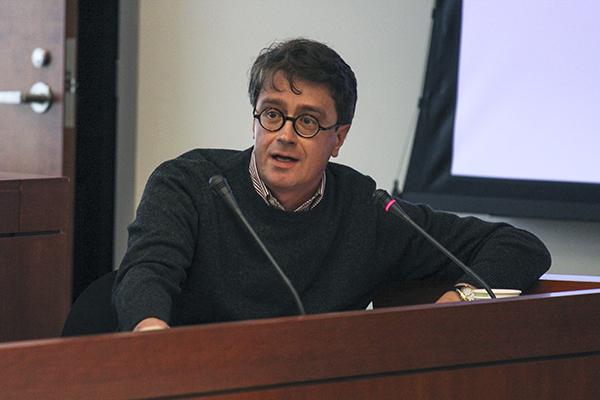The conversation about faculty benefits is still not over.
Faculty Senate members continued the debate about employment benefits at Friday’s meeting. Some faculty questioned officials’ methods for comparing GW’s benefits to peer schools, but all members supported applying benefits changes to their staffs.
The dispute at Friday’s meeting was the fifth Faculty Senate meeting where leaders have sparred over benefits. Officials trimmed tuition benefits by 6 percent last year, and faculty claimed in the spring that administrators then ignored the recommendations from a group specifically tasked with reviewing the issue.
Faculty have doubts about a report done by a consulting firm on the status of GW’s benefits. The report showed that the University’s employee benefits were in line with or exceeding those at 17 institutions, including those GW usually includes as its peers.
The senate passed a resolution in favor of giving faculty and staff more benefits than were laid out by Vice President of Human Resources Sabrina Ellis last month.
Robert Harrington, the chair of the appointment, salary and promotion committee, proposed a resolution at Friday’s meeting to improve the benefits outlined by University administrators this year.
He called for the administration to increase spending on benefits for fiscal year 2017 by more than 3 percent to catch up on health benefits at similar universities.
“The president’s task force came back with the idea for branding purposes,” Harrington, who is also a professor of electrical engineering, said. “They never had to bear the brunt of this increase in health costs.”
Harrington said it’s important to consider things like the cost of living when evaluating benefits. He is a member of the benefits advisory committee, a longstanding group within the Faculty Senate, which regularly comments on the state of benefits within the University, unlike the outside report or task force created to examine the state of benefits at GW.
“Including non-market basket schools in the northeastern United States seemed reasonable to look at those universities in that similar environment, since Washington is the third most expensive city in the country,” Harrington said.
Officials rolled out this year’s plans for health benefits last month amid doubts on from faculty and staff members. Last year, University President Steven Knapp cut back employees’ tuition benefits by 6 percent. Knapp then assembled a task force to assess employees’ benefits, but only adopted one of the recommendations last spring.
On Friday, Knapp said he wanted to hear from the Faculty Senate, the task force and administrators to get the most “apples-to-apples comparison.” Knapp created a benefits task force to remain transparent and involve faculty in decisions about employees’ benefits.
He said he worried about how conflicting proposals for faculty benefits would come across to the Board of Trustees at this week’s upcoming meeting.
“There’s a disparity in the facts asserted here, which will be complicated to the Board of Trustees,” Knapp said. “I’m not sure what to do about this, but it’s going to be a little awkward having someone making a case where the administration will have to say they don’t agree with it.”
Faculty at the meeting, too, feared the inconsistencies between the faculty committee’s findings and administrators would delay process of the Board of Trustees changing benefits.
Harald Griesshammer, an associate professor of theoretical nuclear physics, said after the meeting that he is unsure why Knapp would create two separate groups to investigate benefits, rather than combining forces.
“What he did not do was say, ‘You need more support. We will set you up and have a joint report.’ He made two separate reports,” Griesshammer said. “That’s creating a lot of confusion.”
Griesshammer moved to amend the proposed resolution passed on Friday to include staff as well as faculty because it is necessary to catch both groups’ benefits up, he said.
He added that competitive benefits for staff members would attract and retain the best people for the job. In turn, faculty members would not have to deal with as much turnover or less qualified staffs.
“It’s not how much money is in my pocket. It’s an issue about how can we make sure faculty are as productive as they can be,” Griesshammer said.
The University’s staff association and the Faculty Association have spoken out about a disconnect between administrators and staff members, especially about benefits.
Members of the Faculty Senate also voted to include staff in the resolutions passed, which Kathryn Newcomer, the director of the Trachtenberg School of Public Policy and Public Administration, said was necessary to respond to staff who felt they were not being considered enough in this process.
“Staff aren’t going to be concerned with what’s going on at Boston University or in St. Louis, but they do care about the money coming out of their paychecks,” Newcomer said.








